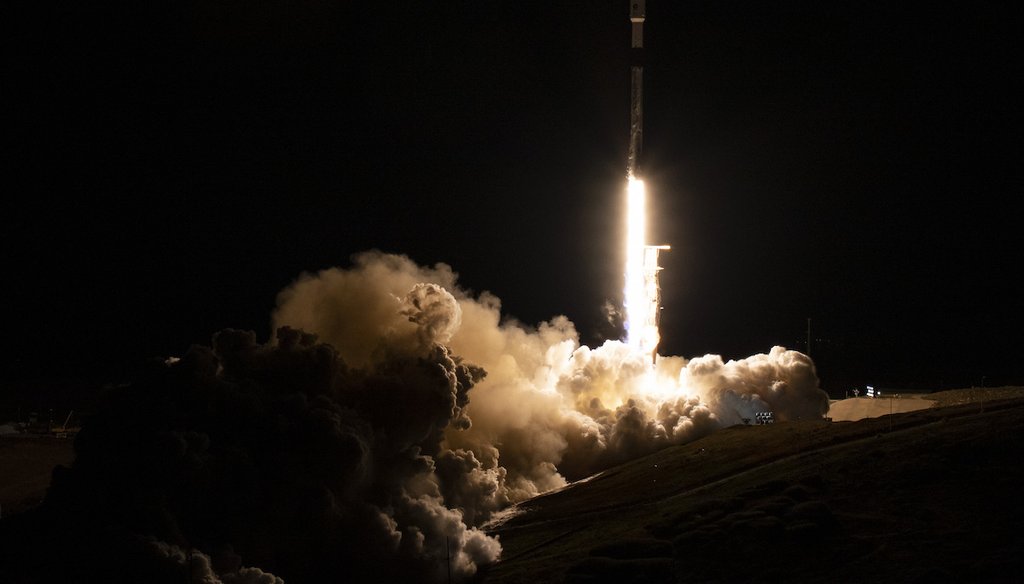

Our only agenda is to publish the truth so you can be an informed participant in democracy.
We need your help.


A SpaceX rocket carrying the Surface Water and Ocean Topography satellite lifts off from Vandenberg Space Force Base in California on Dec. 16, 2022. (NASA via AP)
A video shared on Instagram claimed that NASA, the federal agency most associated with space, has stopped exploring Earth’s oceans.
The video suggested the agency did so out of fear.
Text on the screen appeared as the narrator said:
"Have you ever wondered why NASA stopped exploring the ocean?...What did they discover down there? What are they so afraid of?"
The post was flagged as part of Meta’s efforts to combat false news and misinformation on its News Feed. (Read more about our partnership with Meta, which owns Facebook and Instagram.)
In September, Lead Stories and USA Today fact-checked similar videos and rated them false.
This new claim is wrong, too.
"NASA has been involved in ocean science research since its founding" in 1958, a NASA spokesperson told PolitiFact.
The work happens in the sea and from satellites.
Here’s some of what we found:
NASA’s Physical Oceanography program involves research for understanding the ocean’s role in climate. Study areas include sea level change, ocean surface topography and ocean surface salinity. Researchers also study ocean salinity as it relates to weather phenomena.
In December, NASA presented a 2½-hour program on its Surface Water and Ocean Topography mission, which will "survey nearly all water on the Earth's surface for the first time." The journal Science reported that the $1.5 billion mission will study circular movements of water known as eddies, "the most energetic feature of the ocean, critical to getting climate models right."
In January 2022, the BBC reported on NASA’s exploration of "the deep ocean to search for clues of what oceans on other planets could look like." The Systematic Underwater Biogeochemical Science and Exploration Analog program, or SUBSEA, uses remotely operated vehicles launched from a sea vessel to study ocean depths, according to NASA.
In 2024, NASA plans to launch a space observatory for further ocean study.
On an oceanography page of its website, NASA explained why it studies oceans:
"Part of NASA's mission is to develop an understanding of the total Earth system and the effects of natural and human-induced changes on the global environment. Our oceans play a major role in influencing changes in the world's climate and weather."
An Instagram post said: "NASA stopped exploring the ocean."
NASA has a number of initiatives for studying oceans, some space-based and some in the ocean depths.
We rate the statement Pants on Fire!
Instagram, post (archived here), Jan. 23, 2023
Email, NASA spokesperson Tylar Greene, Jan. 27, 2023
USA Today, "Fact check: NASA continues to explore ocean, did not stop in 1978," Sept. 9, 2022
Lead Stories, "Fact Check: NASA Did NOT Stop Exploring Oceans," Sept. 9, 2022
OceanExports.org, "EXPORTS," accessed Jan. 27, 2023
BBC, "Why Nasa is exploring the deepest oceans on Earth," Jan. 12, 2022
NASA, "Instruments in the Sea and Sky: NASA’s S-MODE Mission Kicks off 1st Deployment," Oct 26, 2021
NASA, "Ocean Physics at NASA," accessed Jan. 27, 2023
NASA, "PACE," Jan. 26, 2023
NASA, "Oceanography," accessed Jan. 27, 2023
NASA, "SUBSEA Research Overview," Oct. 31, 2022
NASA, "Salinity," accessed Jan. 27, 2023
NASA, "Surface Water and Ocean Topography," accessed Jan. 27, 2023
YouTube, NASA "Launch of the International SWOT (Surface Water and Ocean Topography) Mission (NASA Broadcast)" post, Dec. 16, 2022
IOP Science, "The Dynamic of Convergence Zone Displacement in Western Pacific Ocean on 2015 Super El Niňo Event," May 2021
Science, "NASA mission will study how hidden ocean swirls soak up heat of global warming," Dec. 7, 2022
In a world of wild talk and fake news, help us stand up for the facts.
